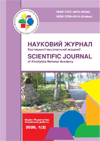UDC 371.13: 316.774 THE ISSUE OF FORMING MEDIA LITERACY OF FUTURE TRANSLATORS
DOI : https://doi.org/10.51706/2707-3076-2020-2-12
Abstract
The globalization of the modern information world has led to the adoption of media culture in virtually all areas of human life – manufacturing, the public sphere, education, communication, and the arts. Media connections are formed between all social structures, countries, different communities. It is through mass communication that the process of rooting values and behaviors that dominate society at a certain time takes place.
In the proposed article, the author argues that at the present stage particular importance is gained by the involvement of an individual in the media culture in the context of preparing young people to interact with the complex information world. It is determined that these processes are important for the professional training of translators, because very often they are representatives of contemporary Ukrainian culture in the world. It is proved that the training of modern specialists requires from them mastering of a whole range of competences - from traditional language to modern information ones. This is justified by the fact that future translation specialists must have up-to-date information technologies in order to ensure high-level translation activities.
The modern standards of higher professional pedagogical education mark that the graduating students of pedagogical educational establishments must be aware of the methods of search, treatment and use of
information; be able her to interpret and adapt addressees in accordance with queries. The marked intercommunications of mediaeducation and professional preparation of future translator are examined as important constituents of his/her professional competence.
Analytical activity of a future translator in relation to mediatext provides for : finding out of conformities to law of construction of mediatext on the whole; immersion in logic of the authorial thinking; reconstruction of conception to the author of a mediatext; determination of the own point of view in relation to a concrete work of mediaculture.
Theoretical preparation of future translators in the context of tasks of mediaeducation necessarily includes different questions in relation to co-operation of medias of the world in the society, theory and history of mediaculture. An informative supply in industry of theory and history of mediaeducation will form the ground not only for successful communicative practice in industry of medias, but also for creation of the own programs of educational orientation medias in the future process of independent pedagogical work at school.
The specificity of professional training of future translators in pedagogical institutions of higher learning predetermines the special attention to the development of professional knowledge and abilities that teachers need for perfecting their own pedagogical culture. Such professional knowledge and abilities can be marked by such indexes: motivational (reasons of mediaeducational activity; aspiring to perfecting one’s own knowledge of media); informative (a level of being informed; pedagogical knowledge of the media industry); methodical (methodical abilities in the sphere of mediaeducation); activity (quality of medias of educational activity); creativity (a level of the creative elements in media educational activity).
Translator that received media education in an institution of higher learning will be able: to encourage students, develop a desire to formulate the problem questions concerning media; use in teaching the research methodology aimed at the organization of independent search of information in media by students for substantiating certain questions; help students to develop skills in relation to the use of various sources of mediainformation; organize discussions in the process of students’ learning to listentolerantlyand tactfully to othersand to express their own opinion.
Development of pedagogical terms of application of mediaeducation in the process of professional training of future translators at the initial stage requires the study of the real practice of intercommunication of modern student youth and mediaculture.


